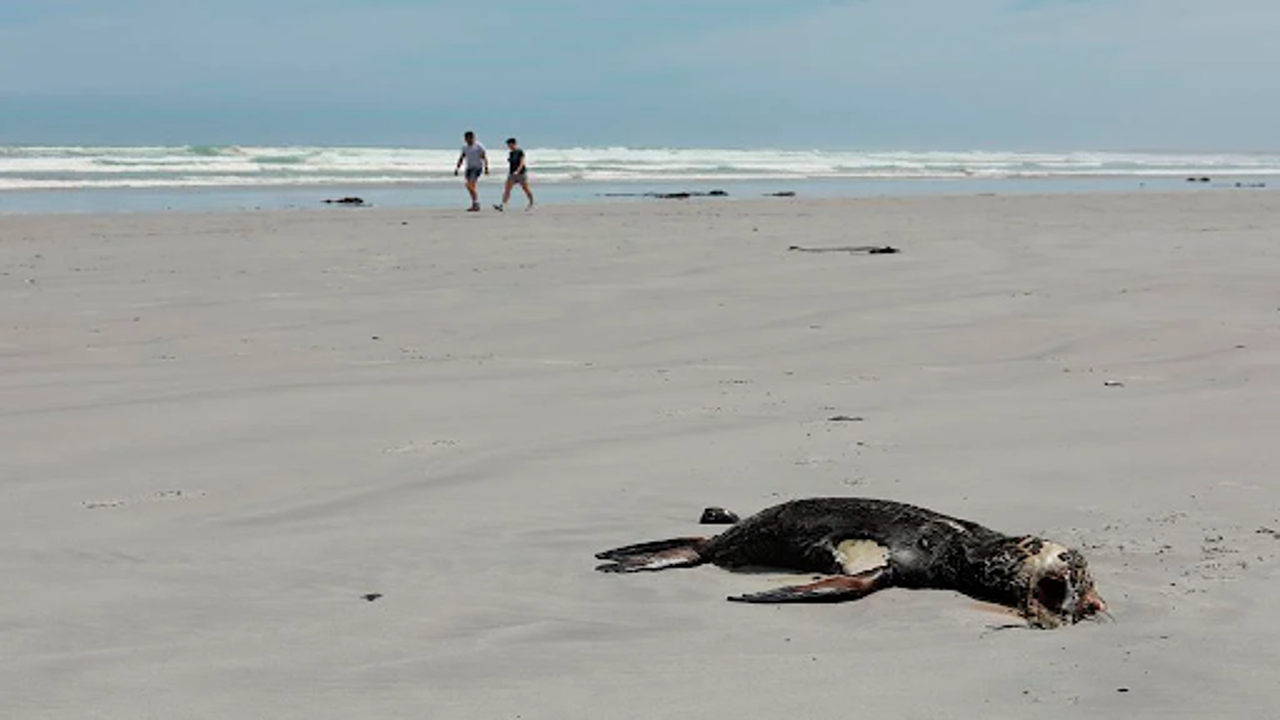
People walk past a dead Cape fur seal on Melkbosstrand beach near Cape Town, South Africa, Friday, Nov. 5, 2021. (AP Photo/Nardus Engelbrecht/The Canadian Press)
Scientists in South Africa have discovered an outbreak of rabies among seals, marking the first known spread of the virus in marine mammals.
At least 24 Cape fur seals found dead or euthanized along South Africa's west and south coasts tested positive for rabies, according to state veterinarian Dr. Lesley van Helden.
Rabies, a virus that affects mammals and can be transmitted to humans, is almost always fatal once symptoms appear. The virus is typically spread through saliva, often via bites, but it can also be transmitted when animals lick or groom each other.
While rabies has long been observed in wild animals like raccoons, coyotes, foxes, and jackals, as well as domestic dogs, it has never before been documented spreading among marine mammals, van Helden and other experts noted this week.
The only previous instance of rabies in a marine mammal occurred in the early 1980s, when a ringed seal in Norway's Svalbard islands was infected, likely by a rabid arctic fox. However, there was no evidence of the virus spreading among seals there.
The rabies outbreak among Cape fur seals was first detected in June when a dog was bitten by a seal on a Cape Town beach. The dog contracted rabies, leading to rabies tests on brain samples from 135 seal carcasses collected since 2021. Around 20 additional samples were gathered, and more positive cases emerged from subsequent tests.
Scientists are now investigating how the virus was transmitted to the seals, whether it is spreading widely within their large colonies, and what steps can be taken to contain it.
“This is all very new,” said Greg Hofmeyr, a marine biologist studying seals in South Africa. “A lot of research is needed, and there are many unknowns.”
Approximately 2 million seals migrate between South Africa, Namibia, and Angola along Africa's south and west coasts. Van Helden suggested that rabies may have been introduced to seals by jackals in Namibia, where these animals prey on seal pups along the shoreline.
Genetic analysis revealed that the rabies virus in the seals closely matched that found in black-backed jackals in Namibia. The virus also appeared to be spreading among the seals, as many of the virus sequences were closely related, van Helden explained.
“It has established itself within the seal population and is being maintained by seals biting each other,” she said.
Seals often live close to human populations in South Africa, particularly on beaches near Cape Town. The city has issued warnings to residents, said Gregg Oelofse, Cape Town's head of coastal and environmental management.
For the past three years, authorities had been puzzled by reports of unusually aggressive seals and an increase in seal attacks on people, some of whom were bitten. No human rabies cases have been reported.
Oelofse noted that the city has begun vaccinating the small number of seals in two popular Cape Town harbors, where they are a local attraction.
One positive rabies test was from a seal carcass collected in August 2022, indicating that the virus has been present in the seal population for at least two years, Oelofse said.
“It’s been here longer than we realized,” he added.
Experts acknowledge that much remains unknown about the situation.
Predicting long-term transmission patterns is difficult, said Dave Daigle, a spokesperson for the U.S. Centers for Disease Control and Prevention. He pointed to past instances where rabies viruses found new hosts but eventually died out. For example, in 2021 in the U.S., gray foxes spread a variant of the raccoon rabies virus for two years before transmission ceased.
The U.S. public health agency is monitoring the situation in South Africa but has yet to see "clear evidence that this will become a long-term issue," Daigle said.
Another question is whether the rabies vaccine will be effective in seals. While it has never been tested in these animals, experts believe it should work.
Logistical challenges also exist, van Helden said, such as how to vaccinate a large number of seals that primarily live in the ocean and migrate along a coastline that stretches over 3,500 kilometers (2,170 miles). While land animals can be vaccinated through bait containing oral vaccines, seals generally only eat live fish, she noted.
South African officials are collaborating with international experts to address the outbreak.
Hofmeyr expressed concern that other seal species that interact with Cape fur seals and then travel to different parts of the world could potentially spread the virus further.
“The chances are low, but the implications could be significant if it does happen,” he warned.















